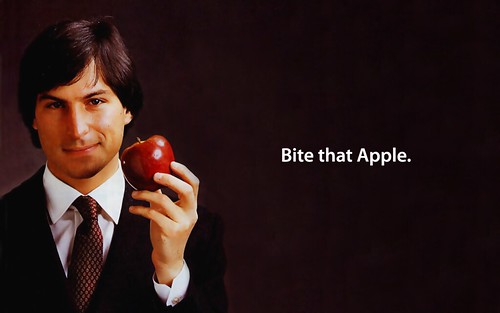Without Steve Jobs, this industry already feels like it has lost something. Something important. A key vibe, philosophy, point of view, … I was struggling with figuring out what until I discussed school work with my kid tween today.
 He has to write some essay, and we were discussing how he was going to type some of it at school and then take it home to finish it. File formats, memory sticks, that kind of thing. I heard myself suggest: “Why don’t you write it in Google Docs, then you don’t have to do anything, just log back in at home and continue right where you stopped.” Then I interrupted myself because I never do that myself: I don’t like Google Docs very much.
He has to write some essay, and we were discussing how he was going to type some of it at school and then take it home to finish it. File formats, memory sticks, that kind of thing. I heard myself suggest: “Why don’t you write it in Google Docs, then you don’t have to do anything, just log back in at home and continue right where you stopped.” Then I interrupted myself because I never do that myself: I don’t like Google Docs very much.
Why? “Oh, it works alright, but what comes out Google Docs is never beautiful. When I create a document, I like it to look beautiful. Google Docs is merely functional.” I said without thinking, at first.
That, in essence, is the Steve Jobs difference. And therefore, the Apple difference, and it is the only company in the entire tech universe (and perhaps beyond) that truly starts with the question “how should this computer/phone/tablet/software/anything work so the user really relates to it?”
Everybody else starts with market segments and use cases and competitive analysis, and form factors, even design. Some, worse, start with profitability calculations. What we get is products that work but that are ultimately meaningless because something else — like the vendor’s business — was at the top of the requirements list for designing it, and it shows.
So Apple, in my view, is the ultimate user-centric company. Not user-centric in the sense we’ve been using it in the identity community (like decentralized, not controlled by anybody etc.) but user-centric in the perhaps more important way of putting the needs and desires and the wishes and dreams of their customer first.
Imagine somebody proposing a product to Steve Jobs that has terrific financial margins and a terrific market size, but is generally a normal, lackluster product. There is no way Steve would have let that product see the light of day. He’d much rather build something for only 10% of the computing market that had to be overpriced (compared to the lackluster products) but that put the human at the center.
Of course, in more recent years, he managed to do both: stratospheric financial results with 100% user-centric design.
Thank you, Steve. You have shown us that there is a better way. Let’s hope many follow — a world with only merely functional, profitable products would be such a sad place to be. And if you don’t keep us all honest, who will?